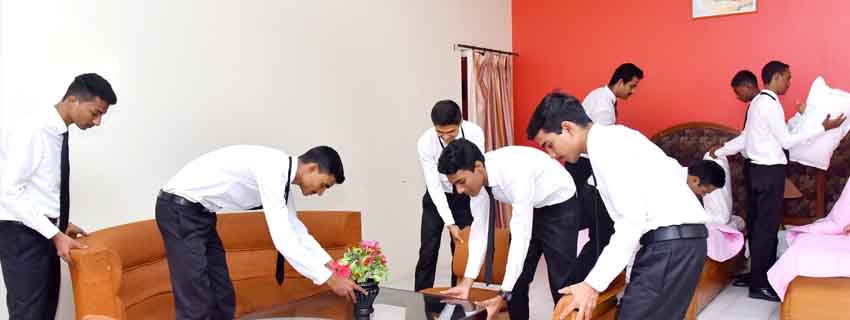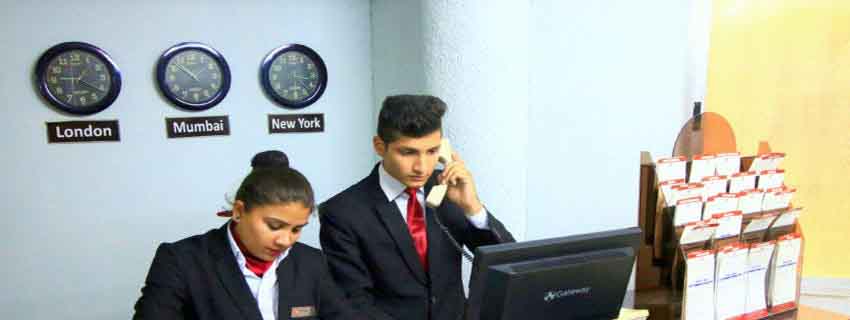Overview
Welcome to the Department of B.Sc. Computer Science, a cornerstone of innovation and excellence at our institution. Our dedicated department offers a transformative B.Sc. Computer Science Program designed to foster a deep understanding of computer science fundamentals alongside hands-on practical applications. Led by a distinguished faculty renowned for their expertise, our curriculum blends theory and practice, preparing students for the dynamic tech landscape. From foundational courses to specialized tracks, our program empowers students with cutting-edge knowledge and critical problem-solving skills. Dive into a wealth of resources, including advanced labs, research opportunities, and collaborations with industry partners. Discover our comprehensive admissions process and explore the myriad of extracurricular activities, internships, and career development initiatives available. Stay connected with our department's latest news, events, and engage with us on social media platforms to be part of our vibrant academic community. Whether you're charting your career path or aiming for advanced studies, our Department of B.Sc. Computer Science is committed to nurturing the next generation of tech leaders and innovators.
Programme
Duration:
3 years (Regular)
No. of Semesters:
6 (Regular)
Eligibility:
Pass in class 12 higher secondary coursework from an accredited board and Mathematics should be included in the stream
Career Opportunities:
Banking Sector - Government and Private Sector Banks, Security Analysist, Head-Finance Manager, Head-Sales Manager, Head- Administrative Officer, Company Secretary, Automobile Industry, Transportation, TNPSC Group Post,IAS,IRS,IFS, Corporate Sector, IT Companies, Educational Institutions, Insurance Sector, Export trades & Services and the like
Vision
Vision is to empower students with a robust foundation in computer science, equipping them with the skills to thrive in a rapidly evolving technological landscape. We aspire to be a hub of creativity and excellence inspiring our students to become visionary leaders and trailblazers in the world of computing and beyond.
Mission
Pursuing academic excellence through a comprehensive and practical curriculum in computer science.
Encouraging research and innovation initiatives among faculty and students.
Cultivating industry partnerships to bridge academia and professional opportunities.
Embracing diversity, equity, and inclusion to enrich the educational environment.
Engaging in community outreach to showcase the impact of computer science and promote technological literacy.
PEOs / PSOs / PO
Programme Educational Objectives (PEOs)
| PEO1. | This program offers extensive exposure to subjects in Commerce, Accountancy, and Management, preparing students for entry-level positions in various industries. It not only facilitates the advancement of their professional careers but also nurtures entrepreneurship, making them valuable contributors to the economic development of the country. |
| PEO2. | The objective of this course is to empower students with the knowledge to comprehend and contribute to the strategic operational policies and practices of managing commercial banks within a competitive landscape. |
| PEO3. | This course equips students to pursue diverse roles in the banking and financial services sector, serving as a foundation for those aspiring to pursue advanced education in areas such as Commerce, Banking, and Management. |
| PEO4. | Offering a comprehensive framework for bank valuation, this course establishes the foundation for discussions on value-based bank management. It delves into topics such as the factors influencing bank value, a detailed analysis of deposit and loan pricing, and the intricacies of risk management in the banking sector. |
Program Specific Outcomes (PSOs)
| PSO1. | Placement: To prepare the students who will demonstrate respectful engagement with others’ ideas, behaviours, and beliefs and apply diverse frames of reference to decisions and action. Further the students are encouraged with add-on value based and job-oriented courses which ensure them to sustain in the organisation level. |
| PSO2. | Contribution to Business World: Apply theoretical concepts to business practices to produce employable, ethical, and innovative professionals to sustain in the dynamic business world. |
| PSO3. | Contribution to Business World: Apply theoretical concepts to business practices to produce employable, ethical, and innovative professionals to sustain in the dynamic business world. |
Programme Outcomes (PO)
| PO1. | Disciplinary knowledge: Capable of demonstrating comprehensive knowledge and understanding of one or more Disciplines that form a part of an Undergraduate Programme of Study. |
| PO2. | Communication Skills: Ability to express thoughts and ideas effectively in writing and orally; Communicative with others using appropriate media: confidently share one’s views and express herself / himself; demonstrate the ability to listen carefully, read and write analytically and present complex information in a clear and concise manner to different groups. |
| PO3. | Critical Thinking: Capability to apply analytic thought to the body of knowledge; analyse and evaluate evidence, arguments, claims, beliefs on the basis of empirical evidence; identify relevant assumptions or implications; formulate coherent arguments; critically evaluate practices, policies and theories by following scientific approach to knowledge development. |
| PO4. | Problem Solving: Capacity to extrapolate from what one has learnt and apply their competencies to solve different kinds of non- familiar problems, rather than replicate curriculum content knowledge; and apply one’s learning to real life situations. |
| PO5. | Analytical Reasoning: Ability to evaluate the reliability and relevance of evidence; identify logical flaws and holes in the arguments of others; analyse and synthesize data from the variety of sources; draw valid conclusion and support them with evidence and examples and addressing opposing viewpoints. |
| PO6. | Research- related skill: A sense of inquiry and capability for asking relevant/appropriate questions, problem arising, synthesising and articulating, Ability to recognise cause and effect relationships, define problems, formulate hypothesis, analyse and interpret and draw conclusions from data, establish hypothesis, predict cause and effect relationships, execute and report the results of an experiment or investigation. |
| PO7. | Co-operation/Team work: Ability to work effectively and respectfully with diverse teams; facilitate cooperative or coordinated effort on the part of a group, and act together as a group or a team in the interests of a common cause and work efficiently as a member of the team. |
| PO8. | Scientific reasoning: Ability to analyse, interpret and draw conclusions from quantitative or qualitative data: and critically evaluate ideas, evidence and experiences from an open minded and reasoned perspective. |
| PO9. | Reflective thinking: Critical sensibility to lived experiences, with self- awareness and reflexivity of both self and society. |
| PO10. | Information/Digital Literacy: Capability to use ICT in variety of learning situations, demonstrate ability to access, evaluate and use a variety of relevant information sources, and use appropriate software for analysis of data |
| PO11. | Self- directed learning: ability to work independently, identify appropriate resources required for a project and manage a project through to completion. |
| PO12. | Multicultural competence: Posses knowledge of values and belief of multiple cultures and global perspective: and capability to effectively engage in a multicultural society and interact respectfully with diverse groups. |
| PO13. | Moral and Ethical awareness /reasoning: Ability to embrace moral/ethical values in conducting one’s life, formulate a position/argument about an ethical issue from multiple perspectives and use ethical practices in all work. Capable of demonstrating the ability to identify ethical issue’s related to one’s work, avoid unethical behaviour such as fabrication, falsification or misrepresentation of data or committing plagiarist, not adhering to intellectual property rights; appreciating environmental and sustainability issues; and adopting objective, unbiased and truthful actions in all aspects of work. |
| PO14. | Leadership readiness/qualities: Capability for mapping out the task of the team or an organisation, and setting direction, formulating and inspiring vision, building a team who can help achieve the vision, motivating and inspiring team members to engage with that vision and using management skill to guide people to the right destination in a smooth and efficient way. |
| PO15. | Life Long Learning: Ability to acquire knowledge and skills, including “learning how to learn”,that are necessary for participating in learning activities throughout life, through self- paced and self-directed learning aimed at personal development, meeting economic, social and cultural objectives and adapting to changing trades and demands of workplace through knowledge/skill development/reskilling. |
Faculty
| S.No. | Name | Designation | Qualification | Profile |
| 1 | Dr.S.MuthuLakshmi |
HOD | M.Sc.,M.Phil.,Ph.D | View |
| 2 | Mr.S.Narayanan |
Assistant Professor | M.C.A ,M.Phil., | View |
| 3 | Mrs T.Sangeetha devi |
Assistant Professor | M.C.A ,M.Phil., | View |
| 4 | Mrs.K.Thanga Prabha |
Assistant Professor | M.C.A ,M.Phil., | View |
| 5 | Mrs.S.Sasi Rekha |
Assistant Professor | M.C.A,M.Phil., | View | 6 | Mr.P.Krishnakumar |
Assistant Professor | M.C.A,M.Phil., | View | 7 | Mrs.A,Akila |
Assistant Professor | M.C.A,M.Phil., | View | 8 | Mrs.R.Suganya |
Assistant Professor | M.C.A,M.Phil., | View |
Rank Holders
B.Sc Computer Science
-
Academic Year Student Name Rank 2021-2022 Miss.Karthika Sri 2 2020-2021 Mrs Pavithra 5




















